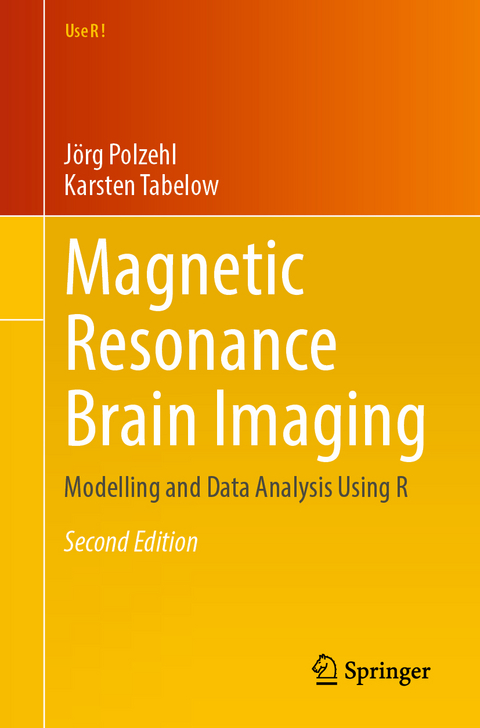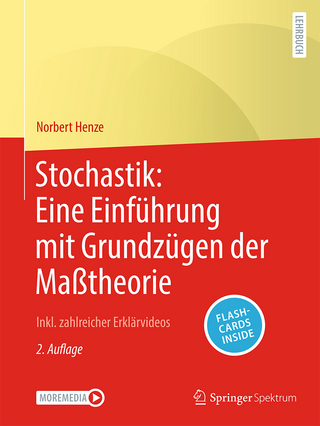
Magnetic Resonance Brain Imaging
Springer International Publishing (Verlag)
978-3-031-38948-1 (ISBN)
The book starts with a short introduction into MRI. The next chapter considers the process of reading and writing common neuroimaging data formats to and from the Rsession. The main chapters then cover four common MR imaging modalities and their data modeling and analysis problems: functional MRI, diffusion MRI, Multi-Parameter Mapping and Inversion Recovery MRI. The book concludes with extended Appendices on details of the utilize non-parametric statistics and on resources for R and MRI data.
The book also addresses the issues of reproducibility and topics like data organization and description, open data and open science. It completely relies on a dynamic report generation with knitr: The books R-code and intermediate results are available for reproducibility of the examples.
lt;b>Jörg Polzehl has retired in 2022 after 25 years as research associate at the Weierstrass Institute for Applied Analysis and Stochastics (WIAS) in Berlin, Germany. He holds a PhD in mathematics from Humboldt University Berlin. His main research interests are in computational and nonparametric statistics, with a focus on statistical modeling and data analysis in medical imaging. He has been elected as a Fellow of the Institute of Mathematical Statistics (IMS) and has been a longtime member of the American Statistical Association (ASA) and the Organization of Human Brain Mapping (OHBM).
Karsten Tabelow is a (particle) physisist by training who currently works as a data scientist at the Weierstrass Institute for Applied Analysis and Stochastics (WIAS) in Berlin, Germany. He is interested in Magnetic Resonance Imaging data of the human brain and considers data modeling and analysis problems with a focus on structural adaptive smoothing methods and biophysical models. He is also interested in reconstruction problems from physics-based imaging modalities. He is a member of the OHBM. Finally, he contributes to the discussion on Open Science and Research Data Handling especially within mathematics. Within the Mathematical Research Data Initiative (MaRDI) with the German National Research Data Infrastructure (NFDI) he is one of the strategic developers of the consortium and a leader of the MaRDI working group at WIAS.
Both authors have jointly coauthored several R packages for the analysis of Magnetic Resonance Imaging data.
- 1. Introduction. - 2. Magnetic Resonance Imaging in a Nutshell. - 3. Medical Imaging Data Formats. - 4. Functional Magnetic Resonance Imaging. - 5. Diffusion-Weighted Imaging. - 6. Multiparameter Mapping. - 7. Inversion Recovery Magnetic Resonance Imaging.
| Erscheinungsdatum | 13.10.2023 |
|---|---|
| Reihe/Serie | Use R! |
| Zusatzinfo | XXI, 258 p. 78 illus., 47 illus. in color. |
| Verlagsort | Cham |
| Sprache | englisch |
| Maße | 155 x 235 mm |
| Gewicht | 428 g |
| Themenwelt | Mathematik / Informatik ► Mathematik ► Wahrscheinlichkeit / Kombinatorik |
| Medizin / Pharmazie | |
| Schlagworte | Brain Connectivity • Diffusion MRI • functional MRI • Inversion Recovery MRI • Magnetic Resonance Imaging • MR Imaging Data Formats • Multi-Parameter Mapping • R Based Processing Pipelines • reproducible research • statistical modeling • structural adaptive smoothing • structural MRI |
| ISBN-10 | 3-031-38948-4 / 3031389484 |
| ISBN-13 | 978-3-031-38948-1 / 9783031389481 |
| Zustand | Neuware |
| Informationen gemäß Produktsicherheitsverordnung (GPSR) | |
| Haben Sie eine Frage zum Produkt? |
aus dem Bereich


